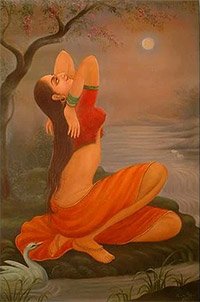Vicitrashakayushabhakshyavikarakriya, Vicitraśākayūṣabhakṣyavikārakriya, Vicitrashakayushabhakshya-vikarakriya: 1 definition
Introduction:
Vicitrashakayushabhakshyavikarakriya means something in Hinduism, Sanskrit. If you want to know the exact meaning, history, etymology or English translation of this term then check out the descriptions on this page. Add your comment or reference to a book if you want to contribute to this summary article.
The Sanskrit term Vicitraśākayūṣabhakṣyavikārakriya can be transliterated into English as Vicitrasakayusabhaksyavikarakriya or Vicitrashakayushabhakshyavikarakriya, using the IAST transliteration scheme (?).
Alternative spellings of this word include Vichitrashakayushabhakshyavikarakriya.
In Hinduism
Kama-shastra (the science of Love-making)
Source: Shodhganga: Elements of Art and Architecture in the Trtiyakhanda of the Visnudharmottarapurana (kama)Vicitraśākayūṣabhakṣyavikārakriya (विचित्रशाकयूषभक्ष्यविकारक्रिय) refers to “cooking of various leaves, soup, food etc.” and represents one of the “sixty four kinds of Art”, according to the Kāmasūtra of Vātsyāyaṇa.—Indian tradition, basically includes sixty four Art forms are acknowledged. The references of sixty four kinds of kalā are found in the Bhāgavatapurāṇa, Śaiva-Tantras, Kāmasūtra of Vātsyāyaṇa etc.

Kamashastra (कामशास्त्र, kāmaśāstra) deals with ancient Indian science of love-making, passion, emotions and other related topics dealing with the pleasures of the senses.
See also (Relevant definitions)
Partial matches: Vikarakriya.
Query error!
Relevant text
Search found 1 books and stories containing Vicitrashakayushabhakshyavikarakriya, Vicitraśākayūṣabhakṣyavikārakriya, Vicitraśākayūṣabhakṣya-vikārakriya, Vicitrashakayushabhakshya-vikarakriya, Vicitrasakayusabhaksya-vikarakriya, Vicitrasakayusabhaksyavikarakriya; (plurals include: Vicitrashakayushabhakshyavikarakriyas, Vicitraśākayūṣabhakṣyavikārakriyas, vikārakriyas, vikarakriyas, Vicitrasakayusabhaksyavikarakriyas). You can also click to the full overview containing English textual excerpts. Below are direct links for the most relevant articles:
Shringara-manjari Katha (translation and notes) (by Kumari Kalpalata K. Munshi)